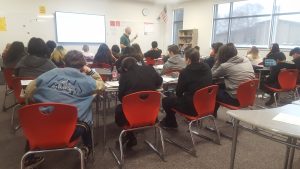Ygor Noblott

When it comes to the educational system there is hardly a more influential subject than literacy. How and what students in grade school are reading and writing will affect everything from how they see the world to their identity. When analyzing the effects of the literacies of middle-school students, it is imperative that adequate examination be given to the topic of sponsorship: who is promoting the reading and writing for the students. This case study, undertaken at West Jordan Middle School, aims to identify the interplay between the literacy histories of those in the classroom—students and sponsors—and their implications. The project is valuable for educators as literacy instructors and sponsors, in order to apply appropriate techniques for the development of their student’s personal literacies.
The project methods consisted of interviews, classroom observation, text analysis, and context analysis. The classroom observed belonged to Brian Bowler, a ninth-grade English teacher at West Jordan Middle school. Mr. Bowler and two of his students (Brinley and Yamileth) were interviewed about their literacy history and practices. The classroom was also observed for insights regarding related literacy learning activities—the text analysis took place in class as well. Lastly, the context analysis was done with research on the educational system and an interview with the school Librarian, Lisa Morey.
PARTICIPANTS
Mr. Bowler, the first participant, learned to read from his parents (his primary literacy sponsors) who read to him when he was young. He had lots of books in his home which he read often: The Little Critters series among other children’s books. That, and frequent trips to the library, coupled with composition courses in school, were influential in the literacy learning of Mr. Bowler. These literacy practices translated to his present: most of the writing he does is centered around his work, with the exception of stand-up comedy. For fun he reads genres such as philosophy, biography, religion, classic literature, world wars, sci-fi, and dystopias. His positive experience may be why Mr. Bowler views literacy as “everything.” He believes that it is a way for people to escape the world and also helps in identifying con-men—those who seek to manipulate others—a skill which he aims to impart to his students.
Unlike her teacher’s sponsors, Brinley’s parents didn’t read much. It was her sister (Brinley’s primary sponsor) who imparted her love of reading to Brinley when she was young. Now she enjoys reading manga, comics, chapter books, and anime like My Hero Academia; she also writes essays about television shows and movies in her leisure time. Brinley believes that she, as a student, owns her literacy, because she has a choice when it comes to absorbing the content of the class and the literature she reads.
Yamileth’s history is similar to her teacher’s and Brinley’s, although her experience with her primary sponsor (her mother) differed. Yamileth’s mother compelled her to read everything she saw when out and about, and would impose strict writing practices from a very early age which Yamileth disliked. Being Hispanic, they saw the benefit of increasing literacy in order to excel in their new home in The States. Yamileth now reads, but very little: typically drama novels. She struggles to grasp the content of her English class which is centered on classical European literature and American styled coursework.
CONTEXT
Although the school system directs literacy with the core standards, it does not have full control over the classroom. Both Mr. Bowler and the librarian, Mrs. Morey, play a major role with what is being read and written. Mr. Bowler chooses his books and class content with a combination of tradition from previous teachers, collaboration with other professionals, and personal preference. Mrs. Morey works similarly and chooses the books in the library with full autonomy. Outside of the district’s review standards, she chooses the content according to age levels, instructional materials, reviews, interest levels, and a large degree of personal experience and preference. The library contains books of a variety of topics but mostly teen fiction, graphic novels, and sports as the main genres. While books about other cultures are available, books from other cultures are not as common.
CLASSROOM
The classroom is organized simply, with little propaganda on the walls, and a small bookshelf with Mr. Bowler’s personal collection. Writing prompts are given every day for five minutes at the start of class, reading log entries with library trips are done often, and projects that include an analysis of classic literature like The Odyssey and Romeo & Juliet are common as well. During study times, less than half of the class reads and most of the content seems to go unnoticed.
As with most educators, the personal literacy history of Mr. Bowler directly affects his teaching and sponsoring, despite attempts to eliminate subjectivity. What he has read in the past and the genres he enjoys now dictate much of the content. The students like Brinley who have similar literacy practices to that of Mr. Bowler’s seem to be more engaged. Yamileth mentioned that her mother reads and that she wanted to read the same book as her mother, but when the classroom was given time for their reading log, she continually neglected participation. There seems to be a gap between her and students like Brinley who read more often and focus comfortably on the reading assignments. The difference may lie in their cultural disparities: Yamileth, being Hispanic, doesn’t appear to have as much to relate to in the class as Brinley does, who is a native and shares a similar background with Mr. Bowler and Mrs. Morey.
Almost all of what Mr. Bowler and Mrs. Morey chose to sponsor was chosen by personal preference, which creates a breach for students like Yamileth, who, although they have literature in Spanish available to them, still have difficulty relating to the context and content of the class. Yamileth has little interest in The Odyssey, but Brinley does. The rest of the class reflects these two’s experiences: the Hispanics, in particular, often disregard their teacher’s instruction, which they see as irrelevant (as do some Caucasian students); and only a handful of students (those with native English-speaking backgrounds and particularly strong literacy practices already in place) are invested in their learning. While The Odyssey may be significant, there is other equally powerful Spanish literature, translated into English, that could be used to reach those students that cannot relate to the cultural literacies of Mr. Bowler. Works by Spanish writers such as Cervantes, Borges, and Marquez have been studied in schools all throughout Latin America, and have been translated into many other languages including English. Their influence is equally as comprehensive as that of The Odyssey. This suggests a possible homogeneity in the development of English teachers, who are taught to welcome variety but are trained with a fixed list that comes from their own sponsors, therefore restricting their personal literacies and the relatability of the content they are teaching.

Mr. Bowler’s goal as an educator is to make critical thinkers of his students, but his goal doesn’t seem to produce much fruit unless the student already has a background as a reader, like Brinley, or shares commonalities with Mr. Bowler. Other students don’t think too much on topics presented in the classroom while students like Brinley, who are accustomed to certain literacy practices, answer not only often but thoughtfully. Brinley believes that she has full control of her literacy, which differs from the receiver mind-frame of students like Yamileth that do not grasp the literacy objectives of their sponsor Mr. Bowler—a common outlook among other Hispanic students that have not acquired the literacy practices or commonalities of their teacher.
CONCLUSION
This case study presents a number of interesting applications for the analysis of literacy within the educational system. While it may be difficult to separate personal preferences from one’s work, a better understanding and application of cultural knowledge may greatly benefit literacy learners in schools. The literacy histories of each participant demand a place in the classroom—which can become problematic for both the sponsors and recipients—each pleading for representation and understanding. An issue that no doubt will impact them greatly.
Furthermore, an argument could be given for the degree of influence that the family has versus the classroom, regarding literacy sponsoring and learning and the identities they create. For student’s like Brinley, their positive experience with their sponsor will determine who they will become. Much like Mr. Bowler with his love of comedy and his literacy-sponsored critical thinking skills, his students will become what they read and write. For some non-native English-speakers like Yamileth, identity might mean something else, since she is fighting to retain her culture while living in a world that differs from home. Her literacy journey will be more difficult to determine and examine; an ideal issue to explore in a much larger case study in the future.
Works Cited
Adler-Kassner, Linda, and Elizabeth Wardle, editors. Naming What We Know: Threshold Concepts of Writing Studies. Utah State University Press, 2016.
Bowler, Brian. Personal Interview. 27 February 2020.
Brinley. Personal Interview. 27 February 2020.
Brandt, Deborah. Literacy In American Lives. University of Wisconsin-Madison, epdf.pub/literacy-in-American-lives.html.
Morales, Yamileth. Personal Interview. 2020.
Morey, Lisa. Personal Interview. 2020.
